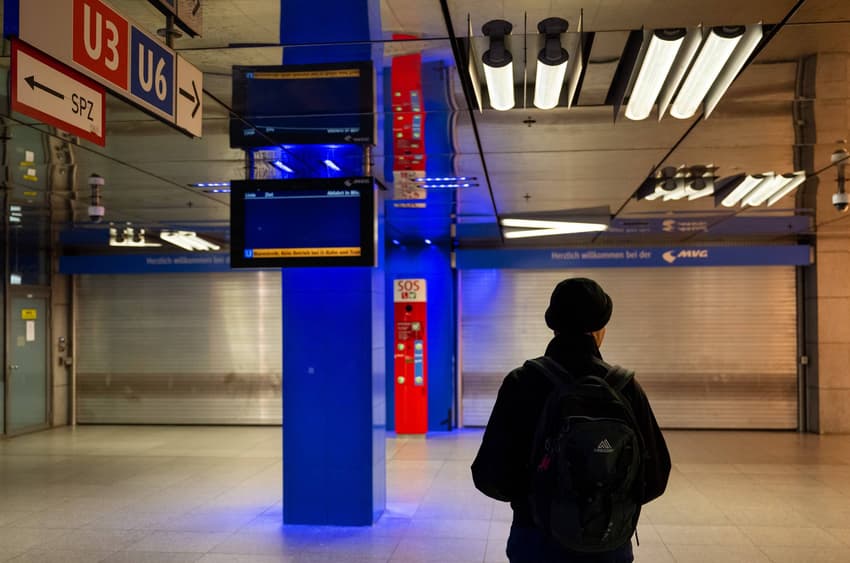EXPLAINED: Why travel chaos from transport strikes in Germany could get worse

After a week of industrial action at several airports in Germany - and on Düsseldorf's public transport network - the threat of more strikes is looming large. Here's why the travel chaos could only just be beginning.
With the cost of living soaring in Germany, unions are currently engaged in a process known as collective bargaining, demanding higher wages from employers to help cope with inflation.
Among them are the EVG Transport and Rail Union - which covers employees of Deutsche Bahn - and the service and public-sector union Verdi.
While rail workers haven't yet joined the wave of strike action Germany has seen in recent months, employees of local public transport operators and airport employees have been making their voices heard.
On Monday, employees at three major airports - Hamburg, Berlin and Hanover - all downed tools, followed by strikes at four other major German airports on Friday. An estimated 76,000 passengers were affected.
This was accompanied by transport strikes in North Rhine-Westphalia - a state that's been hit by multiple days of public sector strikes recently.
But according to reports in Bild and the Süddeutsche Zeitung, a far bigger round of strikes could be on the horizon.
On March 27th, EVG and Verdi are considering a coordinated day of action that would hit not just local public transport and airports, but also train services and even motorways.
While this hasn't been voted on yet, negotiations next week will be crucial in deciding the path forward for the unions. EVG is aiming to meet with representatives from each of the companies whose employees it represents by March 23rd, and will make a decision on the wider strike after that date.
If talks continue to stall, they also have the option of doing what Deutsche Post workers threatened to do shortly before they netted an 11.5 percent pay rise a few weeks back: going on strike indefinitely.
READ ALSO: Will Deutsche Bahn staff be next to strike in Germany?
What are the unions demanding?
The last wage agreement between Deutsche Bahn and EVG was concluded back in 2021, and this agreement is set to expire this year.
To replace it, the union is calling for a new agreement that includes a 12 percent pay increase for workers - amounting to at least €650 extra per month for senior employees and €325 more per month for junior employees. This could boost the pay packets of around 180,000 workers.
Meanwhile, Verdi has been engaged in tough negotiations for around 2.5 million workers in the pubic sector for several weeks. They're asking for a 10.5 percent pay increase amounting to at least €500 per month for employees in local administration, hospitals, local transport, waste disposal and other public-sector jobs.
In the second round of negotiations on February 22nd and 23rd in Potsdam, employers offered a staggered pay increase of five percent alongside inflation compensation bonuses totalling €2,500. Verdi rejected this offer, describing it as "an insult" and "declaration of war" on its members. The next round of negotiations is set to take place between March 27th and 29th.

A Deutsche Bahn ICE train travels along a railway line in the Hanover region. Photo: picture alliance/dpa | Julian Stratenschulte
The unions say their demands are justified by the massive hike in costs their members are facing. Inflation hit 6.9 percent in 2022 in Germany, with price rises even entering the double-digits towards the end of the year.
“We don’t want competition on the backs of workers, but good wages on for all workers in the mobility sector,” EVG negotiator Cosima Ingenschayder told Bild this week.
Deutsche Bahn, meanwhile, says it has had to consider the future viability of the company in light of the ongoing war in Ukraine, its post-pandemic finances and the ongoing energy crisis.
However, on March 15th the company put forward an offer to EVG that includes a five percent pay increase over the next 12 months, one-off inflation bonuses for employees and a 'minimum wage' of €13 per hour. EVG has not yet responded to the offer.
READ ALSO: EXPLAINED: Why are there so many strikes in Germany right now?
Can I get compensation for travel disruption?
If the transport strikes do go ahead on March 27th as planned, there are a number of ways passengers can get compensation for missed or delayed journeys.
Deutsche Bahn's policies state that passengers facing delays of more than 60 minutes can rebook free of charge, or get 25 percent of their ticket price refunded even if they take the journey. If you arrive at your destination more than 120 minutes late, you can claim a discount of 50 percent off the one-way ticket price.

Berlin's S-Bahn in summer. Photo: picture alliance/dpa | Christoph Soeder
You can also check the Deutsche Bahn website or app for up-to-date details on cancelled, delayed or re-routed journeys.
For regional buses and trains, you'll need to check the policies of your local transport operator. Most do offer some form of compensation, though this can be tricky to claim if you have a monthly or yearly subscription set up.
If you've had a flight delayed or cancelled, EU law states that you're also entitled to compensation. This will depend on the delay and the distance of the flight but will generally be €250 for short flights, €400 for longer flights and up to €600 for flights covering more than 3,500 kilometres.
For more information on what you can do in the event of rail or airport strikes, check out our explainers below:
Comments
See Also
With the cost of living soaring in Germany, unions are currently engaged in a process known as collective bargaining, demanding higher wages from employers to help cope with inflation.
Among them are the EVG Transport and Rail Union - which covers employees of Deutsche Bahn - and the service and public-sector union Verdi.
While rail workers haven't yet joined the wave of strike action Germany has seen in recent months, employees of local public transport operators and airport employees have been making their voices heard.
On Monday, employees at three major airports - Hamburg, Berlin and Hanover - all downed tools, followed by strikes at four other major German airports on Friday. An estimated 76,000 passengers were affected.
This was accompanied by transport strikes in North Rhine-Westphalia - a state that's been hit by multiple days of public sector strikes recently.
But according to reports in Bild and the Süddeutsche Zeitung, a far bigger round of strikes could be on the horizon.
On March 27th, EVG and Verdi are considering a coordinated day of action that would hit not just local public transport and airports, but also train services and even motorways.
While this hasn't been voted on yet, negotiations next week will be crucial in deciding the path forward for the unions. EVG is aiming to meet with representatives from each of the companies whose employees it represents by March 23rd, and will make a decision on the wider strike after that date.
If talks continue to stall, they also have the option of doing what Deutsche Post workers threatened to do shortly before they netted an 11.5 percent pay rise a few weeks back: going on strike indefinitely.
READ ALSO: Will Deutsche Bahn staff be next to strike in Germany?
What are the unions demanding?
The last wage agreement between Deutsche Bahn and EVG was concluded back in 2021, and this agreement is set to expire this year.
To replace it, the union is calling for a new agreement that includes a 12 percent pay increase for workers - amounting to at least €650 extra per month for senior employees and €325 more per month for junior employees. This could boost the pay packets of around 180,000 workers.
Meanwhile, Verdi has been engaged in tough negotiations for around 2.5 million workers in the pubic sector for several weeks. They're asking for a 10.5 percent pay increase amounting to at least €500 per month for employees in local administration, hospitals, local transport, waste disposal and other public-sector jobs.
In the second round of negotiations on February 22nd and 23rd in Potsdam, employers offered a staggered pay increase of five percent alongside inflation compensation bonuses totalling €2,500. Verdi rejected this offer, describing it as "an insult" and "declaration of war" on its members. The next round of negotiations is set to take place between March 27th and 29th.

The unions say their demands are justified by the massive hike in costs their members are facing. Inflation hit 6.9 percent in 2022 in Germany, with price rises even entering the double-digits towards the end of the year.
“We don’t want competition on the backs of workers, but good wages on for all workers in the mobility sector,” EVG negotiator Cosima Ingenschayder told Bild this week.
Deutsche Bahn, meanwhile, says it has had to consider the future viability of the company in light of the ongoing war in Ukraine, its post-pandemic finances and the ongoing energy crisis.
However, on March 15th the company put forward an offer to EVG that includes a five percent pay increase over the next 12 months, one-off inflation bonuses for employees and a 'minimum wage' of €13 per hour. EVG has not yet responded to the offer.
READ ALSO: EXPLAINED: Why are there so many strikes in Germany right now?
Can I get compensation for travel disruption?
If the transport strikes do go ahead on March 27th as planned, there are a number of ways passengers can get compensation for missed or delayed journeys.
Deutsche Bahn's policies state that passengers facing delays of more than 60 minutes can rebook free of charge, or get 25 percent of their ticket price refunded even if they take the journey. If you arrive at your destination more than 120 minutes late, you can claim a discount of 50 percent off the one-way ticket price.

You can also check the Deutsche Bahn website or app for up-to-date details on cancelled, delayed or re-routed journeys.
For regional buses and trains, you'll need to check the policies of your local transport operator. Most do offer some form of compensation, though this can be tricky to claim if you have a monthly or yearly subscription set up.
If you've had a flight delayed or cancelled, EU law states that you're also entitled to compensation. This will depend on the delay and the distance of the flight but will generally be €250 for short flights, €400 for longer flights and up to €600 for flights covering more than 3,500 kilometres.
For more information on what you can do in the event of rail or airport strikes, check out our explainers below:
Join the conversation in our comments section below. Share your own views and experience and if you have a question or suggestion for our journalists then email us at [email protected].
Please keep comments civil, constructive and on topic – and make sure to read our terms of use before getting involved.
Please log in here to leave a comment.